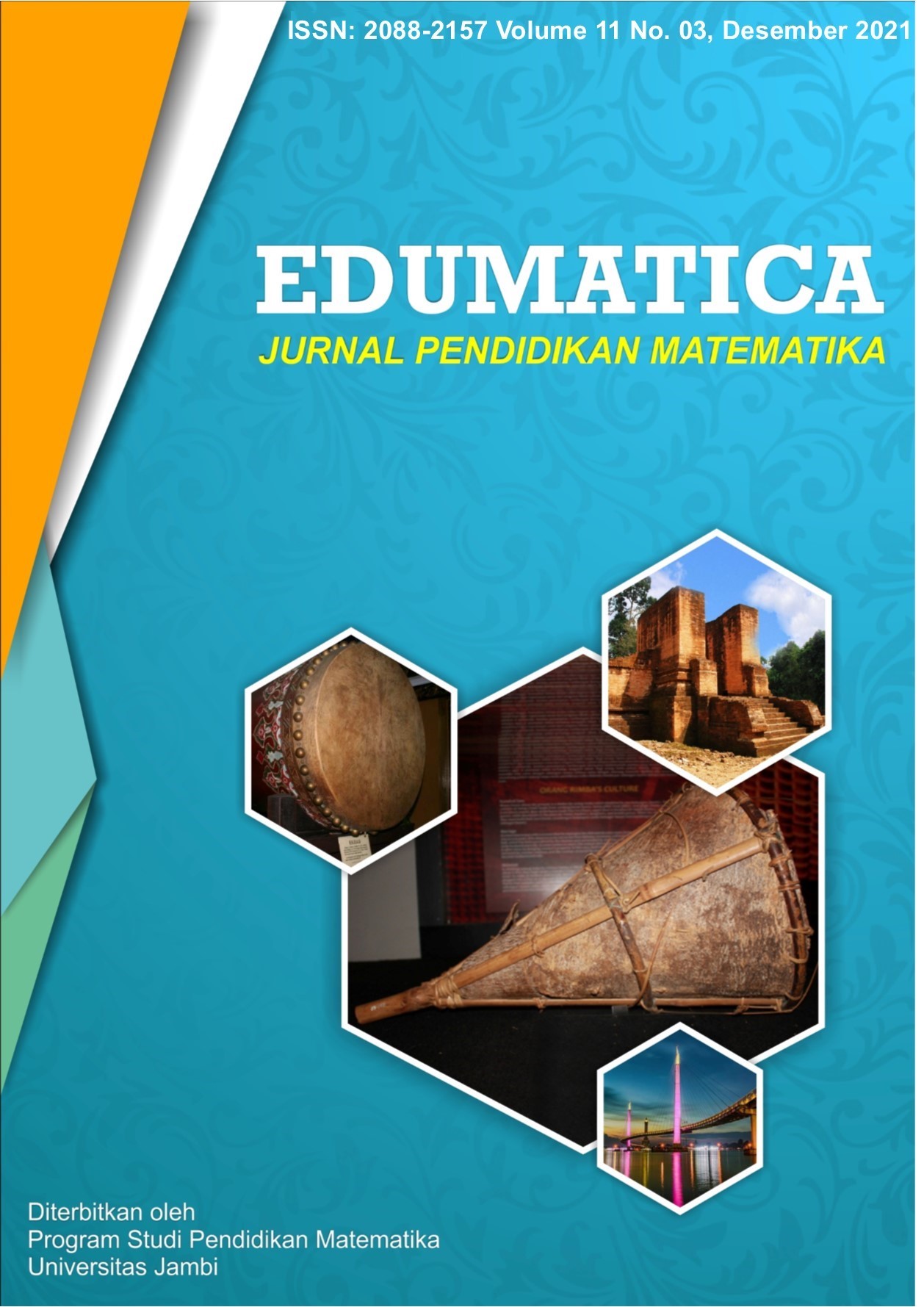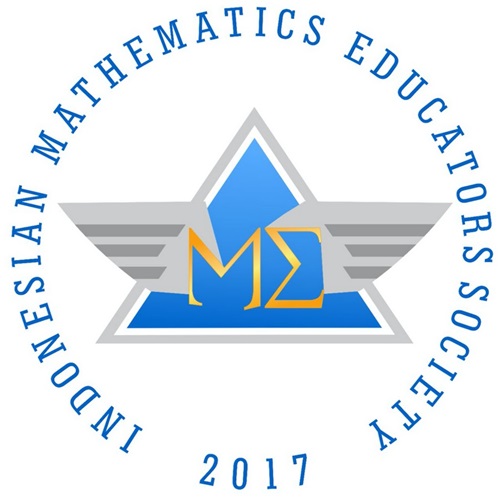Analysis of Student's Mathematical Communication Ability Reviewed by Achievement Motivation
DOI:
https://doi.org/10.22437/edumatica.v11i03.13664Keywords:
achievement motivation, mathematical communicationAbstract
The achievement motivation that exists in students needs to be stimulated so as to provide better changes for their learning outcomes. One of the results of learning mathematics can be seen is mathematical communication ability in solving a given mathematical problem. For this reason, this quantitative descriptive research was conductide with aimed to know the differences in students' mathematical communication ability reviewed high, medium, and low achievement motivation. The data was taken using essay test and a questionnaire to 67 students as respondents at SMA Negeri 1 Purbalingga in 2021. The sampling used purposive sampling technique. Data analysis used descriptive and inferential statistics. In inferential statistics, the One Way ANOVA test with alpha 5% was used and continued using the Scheffe method. ANOVA test prerequisites for Normality test analysis using Kolmogorov Smirnov and Homogeneity test. The result are H0 is rejected with a significance value 0.002 < 0.05 or Fh=7,159 > F 0,05;2;64= 3,23 . It means that there are differences in mathematical communication reviewed achievement motivation. Then does post ANOVA test with the result are students who have high achievement motivation better mathematical communication than students with medium and low. Meanwhile, students who have medium and low achievement motivation have the same good mathematical communication ability.
Downloads
References
Abramovich, S., Grinshpan, A. Z., & Milligan, D. L. (2019). Teaching Mathematics through Concept Motivation and Action Learning. Education Research International, 2019. https://doi.org/10.1155/2019/3745406
Aspriyani, R. (2017). Pengaruh Motivasi Beprestasi Siswa Terhadap Kemampuan Pemecahan Masalah Matematis. JPPM (Jurnal Penelitian Dan Pembelajaran Matematika), 10(1), 17-23. https://doi.org/http://dx.doi.org/10.30870/jppm.v10i1.1194
Astuti, A., & Leonard. (2012). Peran Kemampuan Komunikasi Matematika Terhadap Prestasi Belajar Matematika Siswa. Superlattices and Microstructures, 2(2), 102-110. https://doi.org/http://dx.doi.org/10.30998/formatif.v2i2.91
Budiyono. (2009). Statistika Dasar Untuk Penelitian. Surakarta: Sebelas Maret University Press.
Hodiyanto. (2017). Komunikasi Matematis Dalam Pembelajaran Matematika. AdMathEdu, 7(1), 9-18. https://doi.org/http://dx.doi.org/10.12928/admathedu.v7i1.7397
Mekarina, M., & Ningsih, Y. P. (2017). The Effects of Brain Based Learning Approach on Motivation and Students Achievement in Mathematics Learning. Journal of Physics: Conference Series, 895(1). https://doi.org/10.1088/1742-6596/895/1/012057
NCTM. (2000). National Council of Teachers of Mathematics. The Arithmetic Teacher. www.nctm.org
Nugraha, T. H., & Pujiastuti, H. (2019). Analisis Kemampuan Komunikasi Matematis Siswa Berdasarkan Perbedaan Gender. Edumatica : Jurnal Pendidikan Matematika, 9(1), 1-7. https://doi.org/10.22437/edumatica.v9i1.5880
Nurhaqiqi Noviyana, I., Rochmad, & Rachmani Dewi, N. (2020). Unnes Journal of Mathematics Education Research Student Mathematical Communication Ability Viewed from Self-Confidence in the ARIAS Model Nuanced Ethnomathematics. Ujmer, 9(1), 2020-2106. http://journal.unnes.ac.id/sju/index.php/ujmer
Nurhayati, F. E., Purwanto, S. E., Studi, P., & Matematika, P. (2021). Analisis Motivasi Belajar Matematika Siswa Kelas XI IPA pada Masa Pandemi Analysis of the Mathematics Learning Motivation of Class XI IPA Students during the Covid-19 Pandemic. Edumatika: Jurnal Pendidikan Matematika, 11(April), 93-98. https://doi.org/https://doi.org/10.22437/edumatica.v11i01.12440
Riswanto, A., & Aryani, S. (2017). Learning motivation and student achievement : description analysis and relationships both. COUNS-EDU: The International Journal of Counseling and Education, 2(1), 42. https://doi.org/10.23916/002017026010
Shodiqin, A., Waluya, S. B., Rochmad, & Wardono. (2020). Mathematics communication ability in statistica materials based on reflective cognitive style. Journal of Physics: Conference Series, 1511(1). https://doi.org/10.1088/1742-6596/1511/1/012090
Sudia, M., & Majja, M. (2016). Pengaruh Motivasi Berprestasi Melalui Kombinasi Model Pembelajaran Kooperatif Terhadap Hasil Belajar Matematika. Jurnal Pendidikan Matematika, 7(1), 43-61. https://doi.org/10.36709/jpm.v7i1.2077
Supartik, & Pasaribu, L. H. (2021). Peningkatan Kemampuan Komunikasi dan Kemandirian Siswa melalui Pembelajaran Matematika Realistik Berbantuan Google Classroom Increasing Students ‘ Communication Skills and Independence Through Realistic Mathematics Learning Assisted by Google Classroom. 11(April), 42-49. https://doi.org/https://doi.org/10.22437/edumatica.v11i01.12373
Sutrisna Dewi, K. M., Suwatra, I. W., & Suarjana, M. (2019). Kontribusi Disiplin Belajar Dan Motivasi Berprestasi Terhadap Hasil Belajar Matematika. Journal for Lesson and Learning Studies, 2(1), 121-130. https://doi.org/10.23887/jlls.v2i1.17328
Turmuzi, M., & Kurniawan, E. (2021). Analisis Kemampuan Komunikasi Matematis Mahasiswa pada Materi Geometri Analysis of Students ‘ Mathematical Communication Ability on Geometry Material. Edumatica Jurnal Pendidikan Matematika, 11(April), 50-61. https://doi.org/https://doi.org/10.22437/edumatica.v11i01.12394
Zhao, X., Jia, L., & Maes, J. H. R. (2018). Effect of achievement motivation on cognitive control adaptations. Journal of Cognitive Psychology, 30(4), 453-465. https://doi.org/10.1080/20445911.2018.1467915
Downloads
Published
How to Cite
Issue
Section
License
Copyright (c) 2021 Riski Aspriyani, Bryan Pudji Hartono

This work is licensed under a Creative Commons Attribution-NonCommercial-ShareAlike 4.0 International License.







